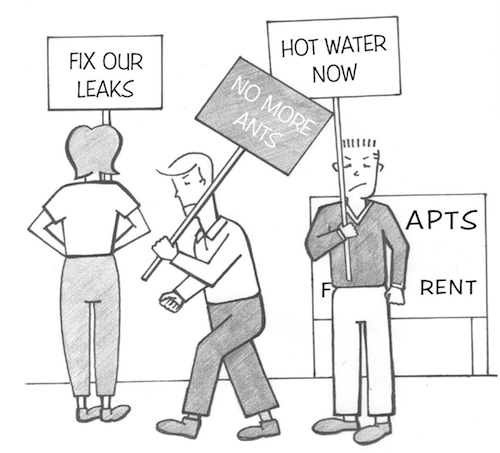

by Miriam Kurtzig Freedman, J.D
Illustrations by Daphne San Jose
Landlord-tenant law varies from state to state and city to city. So beware! This is also a fast-changing area of the law. Here are some of the terms youíll need to know.
Lease:
A lease is an agreement between the landlord and tenant. The landlord gives up possession of the property in exchange for the payment of rent by the tenant. The tenant gets possession of the premises. Note that the landlord keeps the ownership of the property. Possession is the right to use the property for the term of the lease only. Other terms for leasing property include ... to let, to rent, to demise.
Warranty:
An assurance by one party that certain facts exist on which the other party can rely.
Covenant:
A written agreement that specifies promises and obligations.
Rent strike:
A group of tenants withholds rent payments, placing the money in a special bank account (usually under court supervision), while awaiting the landlord's repair of the premises. As with the aforementioned remedies, check local laws and consult an attorney before taking any action on this, as most states limit tenant rights.

Termination:
The end of the lease period. The tenant leaves the premises.
Sublet:
If it's in the lease, a sublet permits the lessee to lease part of his interests in the property to someone else (ìthe sublesseeî). However, if the sublessee breaches the lease (as in not paying rent), the lessee remains responsible for it.
Assignment:
When the lease permits, the lessee can transfer his interest in the property to someone else ('the assignee'). In this case the assignee is primarily responsible for the rent, although the original lessor can still recover from the assignor (the original lessee) if the assignee breaches (fails to pay the rent).
Abandonment:
Occurs if the tenant leaves the premises before the end of the lease without the landlordís consent. The tenant still owes the rent payments until the landlord accepts the abandonment, as in re-renting the property.
Dispossession:
The tenant's losing possession of the premises, whether by legal means (eviction) or wrongfully (by self-help).
Eviction:
The act of removing the tenant from the property through a court order.
Summary process:
A court procedure that is quicker than most civil actions because the rights of discovery are limited. This is usually used in eviction procedures.
Self-Help:
When a landlord removes a tenant without court action. It is illegal.
Constructive eviction:
'Constructive' is something that is not actual but is treated as if it were. Thus, constructive eviction occurs if the landlord does something to the property that makes it uninhabitable and that force the tenant to leave.
Retaliatory eviction:
Is illegal. It occurs when the lessor attempts to evict a lessee for asserting his rights, as in abating his rent, promoting a rent strike, etc.
Home - The Little Law Book - Legal Grind®
EliteAttorneys.com
2640 Lincoln Blvd, Box 6
Santa Monica, CA 90405
310.452.8160
info@eliteattorneys.com